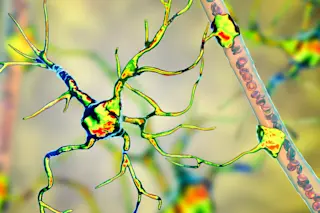As technology advances, electronic implants may or may not
make their way into our bodies. But sometimes your own cells can prove sensors enough. Red blood cells, say scientists presenting work at the American Chemical Society meeting this week
, could eventually be transformed to send doctors messages about your blood chemistry, without ever needing to leave the body. Light, specifically near-infrared light, plays a starring role in this message-sending system. Near-infrared can seep through skin and strike the blood below. Scientists hope to eventually put special dye molecules into patients' bloodstreams that will, if the blood is at a particular pH, for instance, send out a fluorescent glow when light hits them. A monitor that can detect that glow could let doctors keep tabs on blood chemistry without requiring blood samples. There’s just one problem: The immune system registers dye molecules as foreign invaders and filters them out of ...













